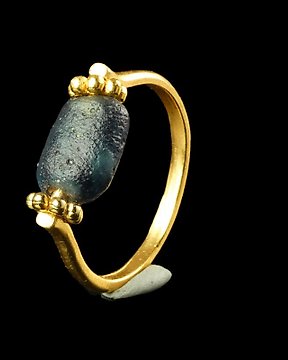
Romersk antikk Ring med romersk glassperle (Ingen reservasjonspris)
Nr. 83906401

Nr. 83906401

Due to custom regulations we can not ship outside the E.U. Please make sure you have an EU shipping address before bidding.
Bracelet, pendant and ring with Roman purple glass beads. The authentic Roman beads are restrung with professional materials and decorative spacer beads.
In Roman society purple was a very desirable colour and a status symbol of the elite.
The wire wrapping technique dates back from ca. 2000 BC and was a favourite technique of jewellery makers of ancient civilizations.
Bracelet in a classic linked design:
Total length: 1± 9,5 cm
Diameter beads: ± 7,1 mm (maximum)
Ring, the bead is set on a new gold-plated ring with wire-wrapping:
Outside diameter: ± 24 mm
Inside diameter: ± 20,7 - 16,3 mm
Diameter beads: ± 11 mm maximum
Pendant with Roman glass and stone beads, partial wire-wrapping and free dangling pendant:
Length: ± 70,3 mm including bail
Diameter beads: ± 9,7 mm maximum
Condition: good condition and wearable. The ancient beads are restrung and combined with modern gold-plated spacer beads and fittings. Signs of wear consistent with age and use. See images.
Ancient/Roman beads:
All authentic ancient beads are slightly different in shape or colour shade and show different signs of wear or iridescence. This adds to the charm of each piece and makes every composition unique.
Certificate of Authenticity available upon request (pdf-document).
ANCIENT GLASS
Glass has always been found in nature, but the humans first created glass about 4.000 years ago. when ancient craftsmen in Mesopotamia discovered the art of mixing sand, soda and lime to make glass.
For centuries, glass was a luxury item and reserved for the upper classes.
Glassmaking centers around the Mediterranean world experimented with new techniques (casting, core-forming, mosaic glass) and with colours by adding metallic oxides (cobalt, copper, etc) to the mixture.
The Romans learned the glass-making craft after the conquest of Egypt in the 1st century BC. During the 1st century AD the glassblowing technique revolutionized the production and made it possible to produce larger quantities. By adding manganese dioxide Roman glassmakers successfully produced colourless or ‘aqua’ glass for the first time.
Roman glass became a very popular material, used for beads, glass windows, mosaic tiles, tableware pieces etc. Roman glass was traded all over the Roman Empire and far beyond to Central Africa, Scandinavia and via the Silk Route to China.
Hvordan kjøpe på Catawiki
1. Oppdag noe spesielt
2. Legg inn det høyeste budet
3. Å gjøre en sikker betaling